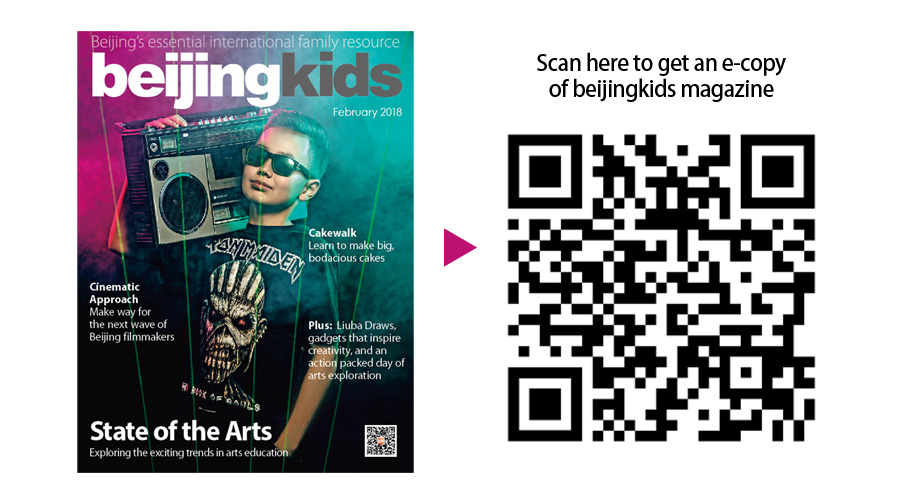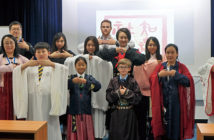All the great filmmakers started young. Steven Spielberg made his first movie at the age of just 10. Entitled The Last Train Wreck, it features the destruction of his model railway set. And Lord of the Rings director Peter Jackson had a short film screened on television when he was only 16.
Now Beijing’s young moviemakers are following in their footsteps. We went to Beijing City International School (BCIS), to talk to students involved in their film club and in The Flux, the annual student film festival.
“The club is called Paper Cut,” Elena from Grade 10 told us. “We meet every Friday, and make videos for the school; so for example during the last Safety Week, we made a video for that.”
We asked whether students had preferred roles when it came to making films.
“No, it’s quite free!” she said. “Everyone can write a script if they have some ideas. If I have ideas while we’re writing scripts I share them with other people. When we are working together as a group, everyone has a job. It’s like a team, it’s more fun.”
Was writing dialogue a challenge, we wondered?
“Actually dialogue is easier than story,” she told us. “You can just write how you speak. The challenge is more about making everything connected. Sometimes you have a basic idea, but you don’t know how to connect the details together, how to make a character into a whole person, to make the story more attractive.”
And as other filmmakers have discovered, the biggest problems are the unexpected ones.
“The most difficult step is from planning to producing a movie. After we have the script we get the people we need, then when it’s all settled, when we go into production, we run into problems with time and cost.”
Elena’s enthusiasm for filmmaking comes from her passion for the art form, she told us.
“I think for me, I really love watching movies, and that brought an interest for me in making my own movies.”
We asked what sort of films she preferred: American or Chinese, contemporary or classic.
“I like American films,” she said. “And I watch a lot of classic films, like from 2000 or even older.”
(At this point the interviewer had to stifle a silent sob at the realization of how old he has become.)
Elena’s favorite director is Christopher Nolan, and though there are no female filmmakers who have inspired her directly, she also admires intelligent, strong-minded actresses like Natalie Portman.
“Personally I think it’s about characters,” she said. “You watch a movie and you learn about life, what it is to experience a different life.”
The same love for movies drives the committee of BCIS’s student-led film festival, Flux. All from Grade 10, we were introduced to Tiffany, Carrie, Victoria L, Shu Ting, and Victoria L (that’s not a typo; there are two Victoria L’s!).
“It’s a competition that celebrates filmmakers’ passion,” Victoria L said. “This year we have four categories: documentary, animation, PSA [public service announcement], and narrative. The theme is ‘relationships’.”
The competition is open to students at Beijing schools in Grade 6-12, and it’s the students themselves who run it.
“We’ve only taken over at the beginning of this year,” Li continued, “because the last leaders graduated. We have particular roles such as advertising, promoting, and organizing, but our roles change as we complete each stage. Right now we’re in preparation for the website, designing the poster, and finding the judges.”
“We all have the same passion for films,” Tiffany said. “We all want to be more skillful in our ability to organize events. And we want to encourage others to make films and tell their story.”
Shu Ting told us that the new committee had discussed ideas to keep improving the festival.
“Last year there were six or seven categories,” she said. “We decided to reduce it to four.”
The 2018 festival will take place on May 29. “There’ll be an award ceremony, as well as playing the winners’ films,” Tiffany said. “And a pizza party of some sort!”
“I think it’s a great platform where people are great at filmmaking get recognized by the community,” said Shu Ting.
We asked whether any of last year’s entrants had stood out. “There was one narrative promoting traditional snack food. It was really professional, the editing was really artistic.”
The film in question is Jianbing in Beijing, which won the documentary category. It’s the work of two students at the International School of Beijing (ISB). We asked Tony H. and Keith L. what drew them to filmmaking, and which directors inspired them.
“When I was younger,” Tony H. told us, “I was fascinated with photography and I really enjoyed taking pictures of nature. I think that through this interest, I first got into the realm of photography. After a while I realized that one picture wasn’t enough for me so I had to take 24 pictures a second, which by the way, is a movie. To find a favorite director is kind of hard for me, if I had to choose, I would go with Denis Villeneuve for now, but honestly, it keeps changing.”
“My situation is quite similar to that of Tony’s,” Keith said. “I used to like photography as well. When I was enrolling for courses for high school (and especially electives) there seemed to be more film-related courses available than photography…so I decided to try those film courses out. My favorite director is Stanley Kubrick because of how implicitly he conveys messages using film techniques.”
Tony explained that he looked to the world around him for his subjects.
“The idea for the Jianbing film came mostly from one of our friends, Jed. He recently moved to Beijing, and we decided that a good way to welcome him into the community would be to make a documentary about jianbing, so that he could learn more about the culture in the process and enjoy some nice authentic street food. For other films, my biggest inspirations come from real life, and either the situations it puts me in, or things that I see happen.”
But that can itself bring challenges, Keith said.
“I think the biggest challenge that we faced was convincing the jianbing ladies to work with us. As student filmmakers, it is hard to provide financial incentives for actors to star in our documentary. Eventually, with some help from our teacher, they were finally willing to work with us.”
“Yeah, I agree with what Keith said,” Tony added. “Definitely the talking and the coordinating was the hardest part of the jianbing film. Another big challenge would be just tackling how to get the shot. Often times it’s easier thought than done, and even with the right tools, some shots just take patience and lots of takes. We were once shooting another film, and stayed stuck in a bathroom for two hours trying to get a shot of a light just right, and in the end, I think once you have that shot, all the time spent is definitely worth it.”
Tony willingly acknowledged the support they received from ISB staff, and the wider school community.
“If it weren’t for the help from Mr. Rosevear, the drama teacher at our school who helped us with the narration, I think the video wouldn’t have had the same effect on audiences. Our friends were quite supportive of the production of the film, and a few members of our crew were really happy to help out.”
We asked them what they had learned from the process
“We learned the importance of time management,” Keith said. “We did not have a timeline of all the internal due dates that we should have met for this project, which put us in a big rush and in the end, but thankfully, Tony pulled an all-nighter to finish the sound and add finishing touches on the film.”
“Another big part of the learning was of the actual process of making a documentary,” Tony added. “At the time, Jianbing was our first documentary, and we had no idea how everything was going to work. We came up with our own workflow and planning process as we went along, and I think the lessons we learned from experience were much more valuable compared to spending a day in class.”
Then came their success at the Flux festival.
“We never intended to submit this film to any festivals,” Keith told us. “Our film teacher, Mr. Dawson, introduced the AAYFF, S2F2, Flux film festival, et cetera to us and thought it would be great for us to try it out. The moment when they announced the winners for best documentary, I actually was not paying attention to the livestream. Then, I heard ‘Jianbing’ and I was genuinely surprised and wasn’t expecting it. I felt pretty proud of our team and what we had accomplished.”
“Being at all of the ceremonies,” Tony said, “I get really nervous every time they announce the winners, because after all, you never know who it might be. When I found out it was us, I didn’t know what to think. I was nervous to be on stage, especially when I was at AAYFF, because lots of people were streaming the show and the audience was really big. I think that in the end I just felt really proud of us and what we managed to accomplish. It’s always a great experience going to film festivals in general as well, to either just meet people and learn something new from someone else, or to just enjoy the event itself.”
Jianbing was just the beginning for Tony.
“Since the documentary, he said, “I’ve already made a documentary and another couple short films other than documentaries that can be found on www.tonyhuangphotography.com. I’m currently finishing up a film that is in post-production at the moment, and we’re planning on making another short film very soon.
“I would definitely want to pursue a career in film,” he continued. “I think that my goal would be to just make a film that is really touching, and makes a big impact on people. Being able to change the way that people see things through a film is just really powerful, and I want to be able to do so.”
“I see film as an interest,” Keith said, “but I do not wish to further pursue film in the future. As of now, I’m still unsure of what I want to do in the future, but hopefully, time will tell. Who knows, maybe someday in the future I’ll be making films with Tony again!”
Whatever careers these young people go on to, it’s clear that right now film is providing them with a medium to exercise their creativity and push the boundaries of what they can do. As Mark Ellison, teacher at BCIS, puts it: “Filmmaking is about letting kids tell a story and express themselves safely and creatively. It is a powerful educational tool.”

Photos: the Beijinger, Uni You, Pixabay
This article appeared on p39-41 of beijingkids February 2018 issue.




